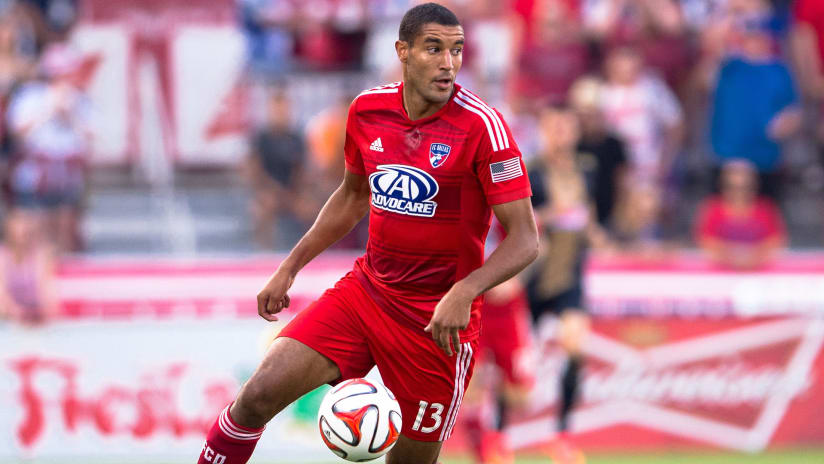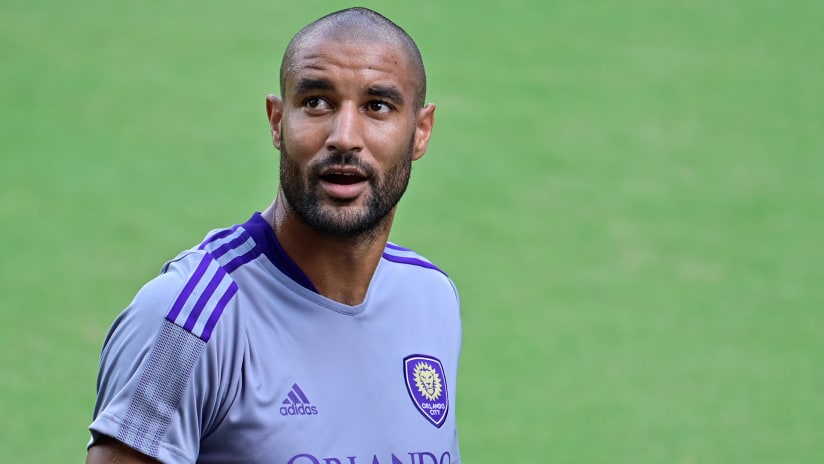Most players squeeze every last drop out of their time on the pitch, competing until their bodies or opportunities for playing time give out. That makes Tesho Akindele, who last week called time on his MLS career at the age of 30, something of an exception.
As does his plan for the next chapter in his life.
“Honestly, I completely went in the league way longer than I would have ever imagined,” the Nigerian-Canadian-American striker and father of two told MLSsoccer.com in a wide-ranging conversation after his announcement.
“I was hoping for like, three years to play; I ended up playing nine. But I was always [thinking], it could end any day, and I need to be prepared for what's next. Because I had a wife, I was hoping to have kids, now I do have kids. You have responsibilities, so I always wanted to make sure I was able to just get a smooth, easy transition, provide for my family whenever the game ended.”
That transition won’t take place in coaching or broadcasting, but in the rapidly-emerging field sometimes dubbed urbanism. That and other labels are shorthand for a broad but interconnected range of civic and economic topics, from real estate development and affordable housing to urban planning and land use and infrastructure.
“I want to be part of building the better neighborhood, basically,” Akindele explained.

The power of social media
And in another sharp contrast to the professional athletic norm, Akindele says “it's almost entirely thanks to Twitter” that he’s on this new path in life.
It turns out that the guy who scored 43 goals and 16 assists over 237 career MLS regular-season games also “might be the highest-profile, vocally urbanist professional athlete,” in the words of planner/engineer Ray Delehanty, who creates urbanism video content under the tag CityNerd.
“I just made a conscious decision about a year ago, maybe a little bit more,” Akindele recalled of his social-media approach, “to start talking about things that I'm interested in outside of soccer. Because you follow a lot of athletes, and a lot of us, we post when there’s a game, like ‘game day tomorrow, really excited’ or ‘it was a good game’ and you post a picture of yourself, and that's great.
“But I also know that a lot of athletes are kind of holding part of themselves back. People are interested in other stuff off the field, whether it's music or video games or real estate, in my situation, or business, and you don't hear a lot of athletes talking about that. … I was interested in affordable housing. And then through interactions with other people on Twitter, it guided me to something that I found I was specifically passionate about.”
Akindele, in the jargon of this sector, is a YIMBY. That’s short for “yes in my backyard,” the converse of the term NIMBY, or “not in my backyard,” used to refer to residents and other entities who resist various new construction or development projects in their area. To cite one example, many blame the latter attitude for crimping the pace of housing construction across the United States and Canada in recent years, reducing access to affordable housing, raising costs of living and fueling homelessness.
This also runs to more intangible matters – like cultivating compact, walkable neighborhoods with higher quality of life, more shared public spaces, shorter commutes and less pollution and fossil-fuel consumption.
“Just building a little bit more density, especially around transit stations – like where I moved here in North Carolina, they have a light rail, and I’m a few minutes’ walking away from the light rail,” said Akindele. “And then they have huge apartment complexes all up and down the light rail stops. So I think that's a good idea.
“Opening zoning up so that you can have more things sprinkled right into residential neighborhoods, it's a good idea. So you can walk right to the local bakery or whatever and get a few of your daily chores done without cars. I think stuff like that, just bringing everything a little bit closer together – including people. Bringing people closer together and bringing the places you need to go a little bit closer together.”
A different perspective
Akindele credits a combination of life experiences and learning processes for guiding him towards concepts like density, mixed-use and transit-centered planning as tools for addressing bigger challenges like gentrification, economic justice and climate change. Some of that actually happened in MLS locker rooms, like his chats with his former Orlando City teammate Ercan Kara, who admitted to Akindele that he was “just shocked” by the consequences of the car-centric culture found in most of North America.
“He grew up in Austria, which is a great urbanist place, a lot of good stuff going on there,” said Akindele. “He came over with his wife and just trying to navigate the difference between being in Austria vs. being in the Orlando exurbs, he was like, mind-blown. So we had some good conversations around that.”

So Akindele put himself out there via Tweets and recurring Twitter Spaces. He’d already been well down the road towards a more formal sort of education, though – one less likely to be second-guessed by coaches and fans. He earned multiple university degrees from Southern New Hampshire University via that school’s partnership with MLS, which added to his undergraduate studies in engineering at the Colorado School of Mines.
“When I was at [FC\] Dallas, I didn't really think about, why do I have to drive everywhere? Why does it take 30 minutes to get to a restaurant? You’re just like, ‘this is what it is,’ instead of thinking, maybe we can do it differently,” said Akindele, a surprise first-round SuperDraft pick by FCD who went on to win 2014 MLS Rookie of the Year and earn 19 caps for the Canadian national team after a college career in NCAA Division II.
“There's a lot of researchers and urban planners who are in the weeds, know the details, and maybe their message is not getting out to the whole world. I think it just needs a better PR campaign. I think these ideas are very persuasive, but they're just not being translated to everyday people. What I'm trying to do is hopefully just make people think about: Did you ever think about why you have to drive every single place you go? Is that a little bit weird to you?”
Charlotte: The next chapter
For him, his wife Taylor and their young sons Hayes and Rook, that includes moving to just such a neighborhood on the rise, Charlotte’s NoDa district. When Taylor’s accounting career pointed her to the fast-growing North Carolina metropolis, Tesho realized he could put his new pursuits into practice.
He’ll soon be working with real-estate developer ATCO Properties & Management on the Camp North End project. The “Camp” there is short for Charlotte Army Missile Plant, a sprawling 75-acre warehouse district that housed a Model T factory and other automotive manufacturing as well as U.S. Army munitions construction, pharmacy facilities and other industries over the past century.
With historic architecture, some 1.2 million square feet of indoor space and a prime location a couple of miles north of the urban core anchored in part by Charlotte FC’s Bank of America Stadium, it’s a tantalizing opportunity to mobilize the ideas Akindele has been thinking and talking about when he wasn’t out on the pitch. His job offer came from a conversation that started on Twitter too, by the way.
“They're basically turning it into an ideal neighborhood and I want to be a part of that project, and things related to that,” he said of Camp North End. “Basically, I want to walk the walk. I think I've been talking the talk a little bit for a year – and of course, I was playing soccer, there's nothing I could have done, really, too much back then. But I want to also walk the walk and build those buildings.”
Akindele is already planning to make the short trip over to BofA when Orlando City visit CLTFC in late August, citing his close relationships with Lions head coach Oscar Pareja and general manager Luiz Muzzi, whom he also played under at FCD. And he hopes to eventually link his new career back to his old one in a manner that’s characteristically Tesho.
“I'm still formulating my thoughts, but I'm trying to basically convince more athletes why urbanism is a good form of giving back to their community,” Akindele explained. “I guess my argument is, a lot of athletes spend time volunteering. Every team has a foundation and usually you might go to a hospital or a Boys and Girls Club, which I think is great, and I encourage people to do more of that. But I also think, what better way to give back to the city that you're playing in than to make it a better city?
“If you can be part of bringing an apartment building to life that's high-quality, affordable housing in a good neighborhood, I think that's a really good way to give back and spend your time and money. So that's something that I'm also thinking about trying to work on and talk about a little bit, is getting more athletes specifically involved in urbanism. Because I think it's a great way to give back, which a lot of athletes are passionate about.”











